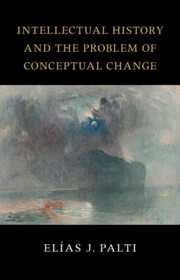Book contents
- Intellectual History and the Problem of Conceptual Change
- The Seeley Lectures
- Intellectual History and the Problem of Conceptual Change
- Copyright page
- Contents
- Preface
- Acknowledgments
- Introduction
- Chapter 1 Pocock, Skinner, and the “Historiographical Revolution”
- Chapter 2 The Republican Genealogy and the Normative Temptation
- Chapter 3 The Problem of Conceptual Change
- Chapter 4 Conceptual History
- Chapter 5 Koselleck’s Begriffsgeschichte
- Chapter 6 Hans Blumenberg and the Theory of Nonconceptuality
- Chapter 7 From Structuralism to Poststructuralism
- Chapter 8 Foucault’s Archaeology of Knowledge
- Chapter 9 The Archaeological Project and the Ignored Epistemic Mutation
- Chapter 10 Behind the Structures and the Subject
- Conclusion
- Epilogue
- Quoted Bibliography
- Index
Chapter 10 - Behind the Structures and the Subject
The “Event”
Published online by Cambridge University Press: 02 May 2024
- Intellectual History and the Problem of Conceptual Change
- The Seeley Lectures
- Intellectual History and the Problem of Conceptual Change
- Copyright page
- Contents
- Preface
- Acknowledgments
- Introduction
- Chapter 1 Pocock, Skinner, and the “Historiographical Revolution”
- Chapter 2 The Republican Genealogy and the Normative Temptation
- Chapter 3 The Problem of Conceptual Change
- Chapter 4 Conceptual History
- Chapter 5 Koselleck’s Begriffsgeschichte
- Chapter 6 Hans Blumenberg and the Theory of Nonconceptuality
- Chapter 7 From Structuralism to Poststructuralism
- Chapter 8 Foucault’s Archaeology of Knowledge
- Chapter 9 The Archaeological Project and the Ignored Epistemic Mutation
- Chapter 10 Behind the Structures and the Subject
- Conclusion
- Epilogue
- Quoted Bibliography
- Index
Summary
Chapter 10 elaborates on an epistemic mutation that took place at the end of the nineteenth century and that Foucault missed. It is this that opened that conceptual universe within whose frameworks the theories analyzed in this book could emerge. This, thus, provides fundamental tools to understand the structure of those theories, as well as the problems they found to account for the issue of conceptual change. Finally, it discusses how this new episteme, in turn, starting dissolving, thus raising the issue of the constitutive incompleteness of systems. It will mark the transition from phenomenology to postphenomenology and from structuralism to postructuralism, which entailed, in turn, a new radical redefinition of the concept of the temporality of conceptual formations. Derrida´s criticism played a key role here. Lastly, as this chapter shows, this transformation, as the other epistemic mutations previously studied, traverse the whole thinking of the period, comprehending both the natural sciences and the humanities. It thus allows us to draw meaningful connections among the different areas of knowledge.
- Type
- Chapter
- Information
- Intellectual History and the Problem of Conceptual Change , pp. 210 - 227Publisher: Cambridge University PressPrint publication year: 2024

